北师大版(2019) 必修第三册 Unit9 Learning Lesson1 Active Learning课件(36张)
文档属性
| 名称 | 北师大版(2019) 必修第三册 Unit9 Learning Lesson1 Active Learning课件(36张) | 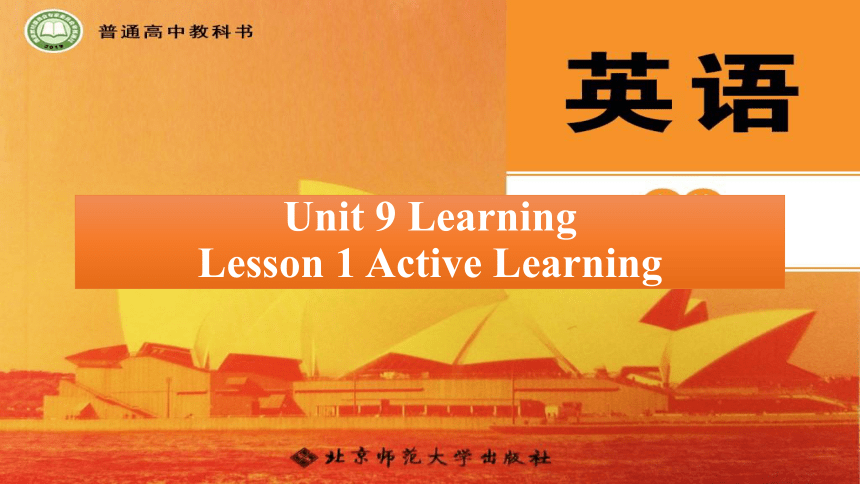 | |
| 格式 | pptx | ||
| 文件大小 | 1.7MB | ||
| 资源类型 | 教案 | ||
| 版本资源 | 北师大版(2019) | ||
| 科目 | 英语 | ||
| 更新时间 | 2022-04-01 12:36:41 | ||
图片预览

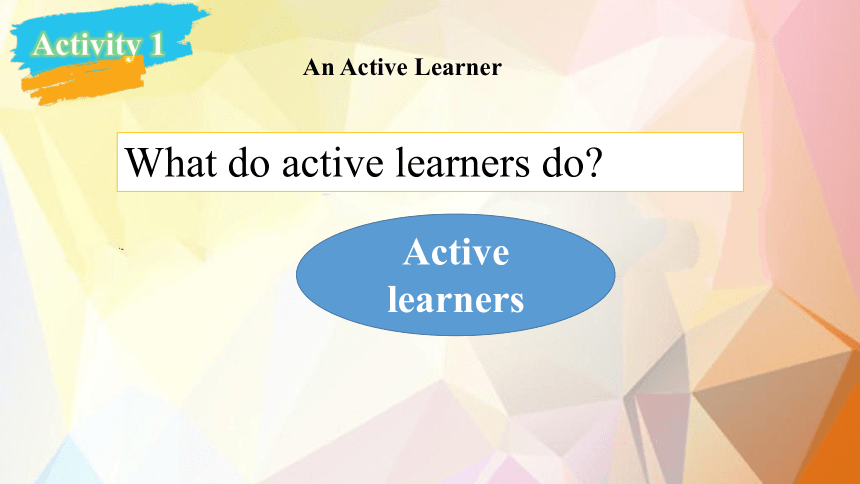
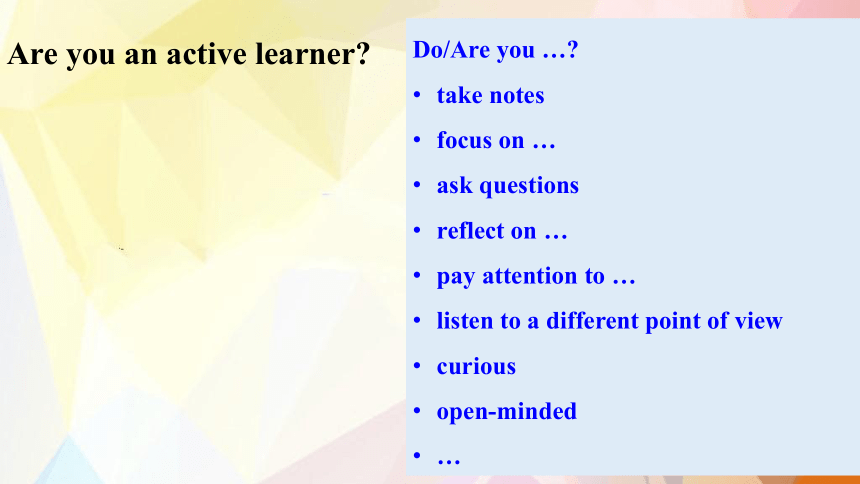
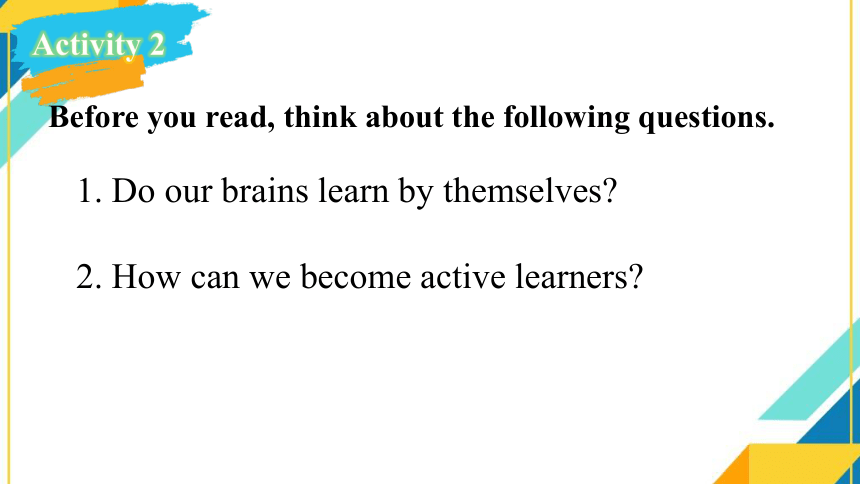
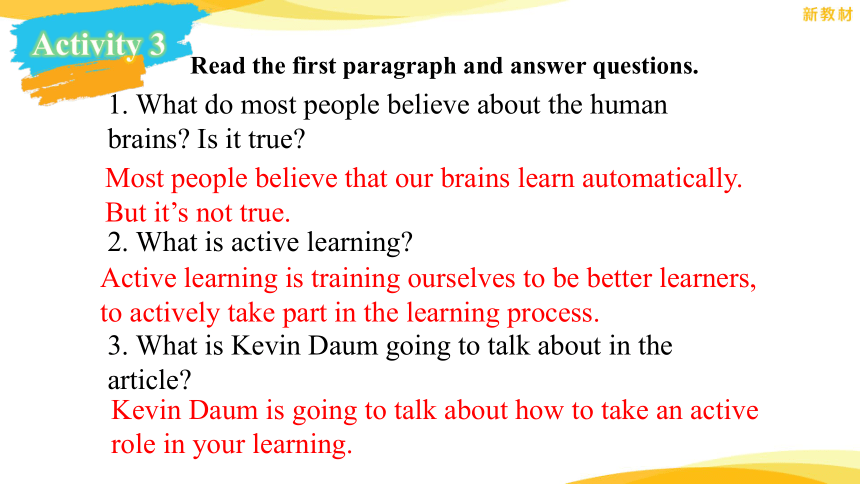
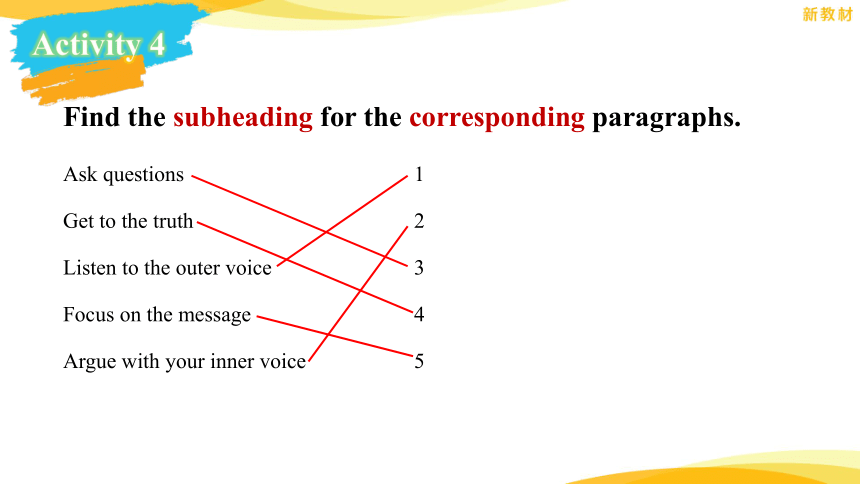
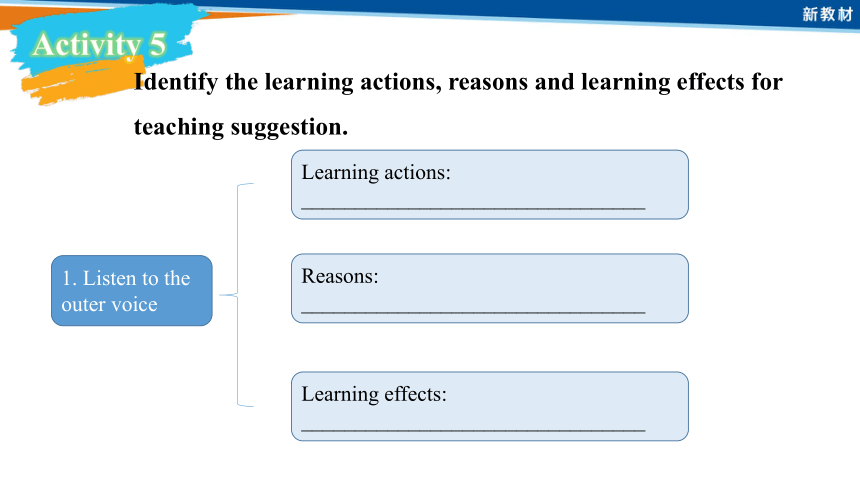

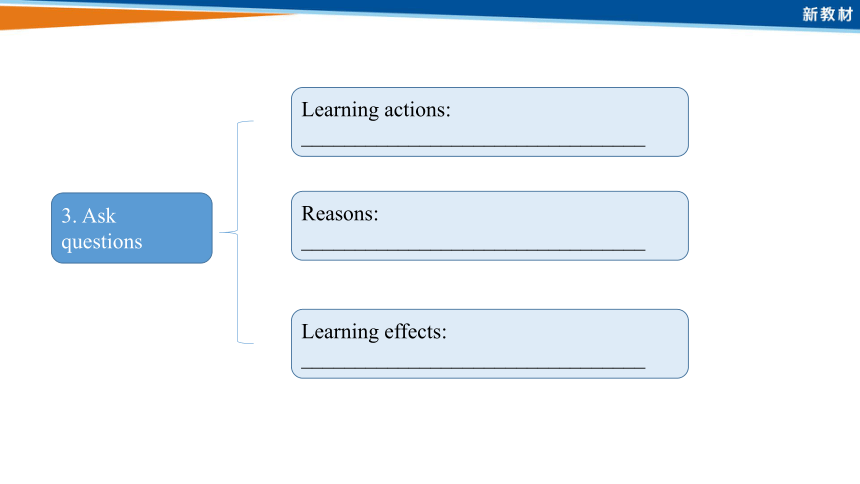
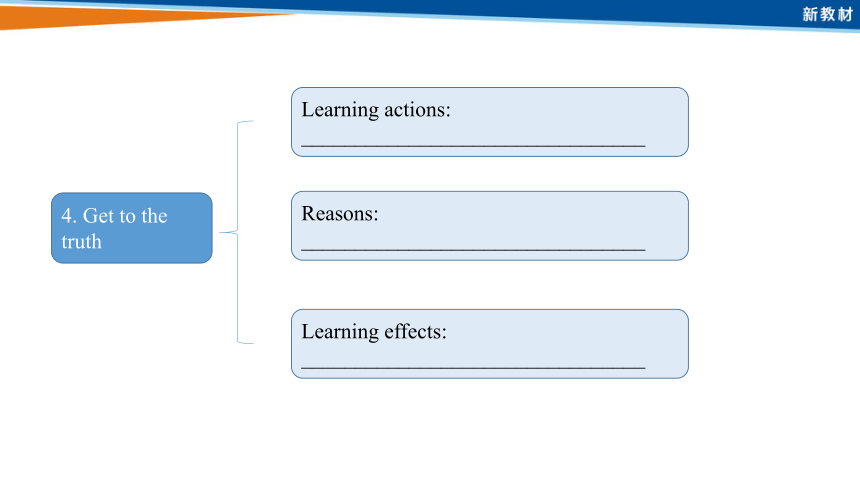
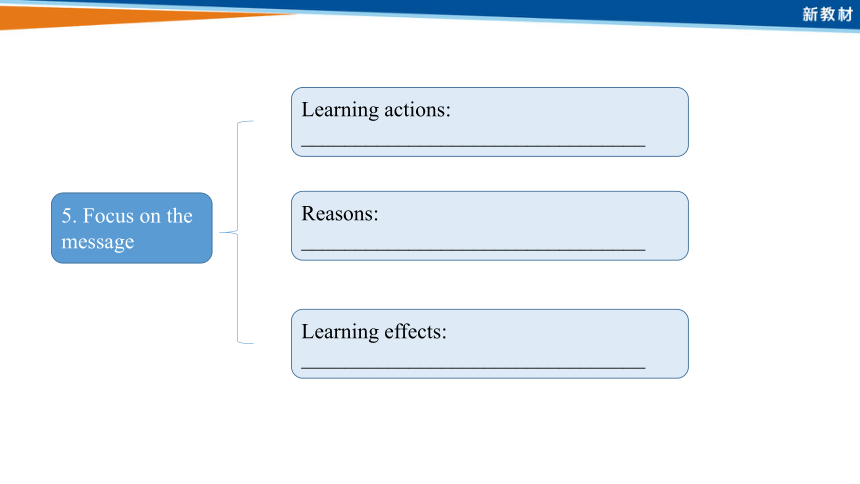
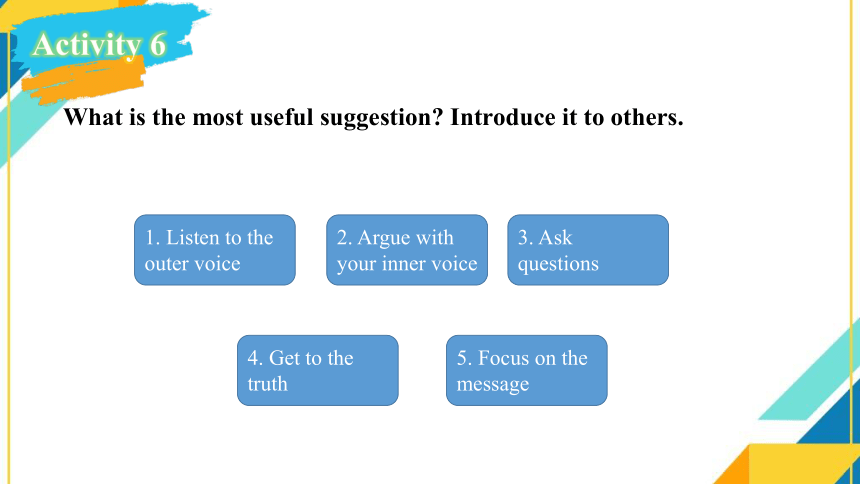
文档简介
(共36张PPT)
Unit 9 Learning
Lesson 1 Active Learning
An Active Learner
Activity 1
What do active learners do
Active learners
Are you an active learner
Do/Are you …
take notes
focus on …
ask questions
reflect on …
pay attention to …
listen to a different point of view
curious
open-minded
…
Activity 2
Before you read, think about the following questions.
1. Do our brains learn by themselves
2. How can we become active learners
Activity 3
Read the first paragraph and answer questions.
1. What do most people believe about the human brains Is it true
2. What is active learning
3. What is Kevin Daum going to talk about in the article
Most people believe that our brains learn automatically. But it’s not true.
Active learning is training ourselves to be better learners, to actively take part in the learning process.
Kevin Daum is going to talk about how to take an active role in your learning.
Activity 4
Find the subheading for the corresponding paragraphs.
Ask questions
Get to the truth
Listen to the outer voice
Focus on the message
Argue with your inner voice
1
2
3
4
5
Activity 5
Identify the learning actions, reasons and learning effects for teaching suggestion.
1. Listen to the outer voice
Learning actions:
________________________________
Reasons:
________________________________
Learning effects:
________________________________
2. Argue with your inner voice
Learning actions:
________________________________
Reasons:
________________________________
Learning effects:
________________________________
3. Ask questions
Learning actions:
________________________________
Reasons:
________________________________
Learning effects:
________________________________
4. Get to the truth
Learning actions:
________________________________
Reasons:
________________________________
Learning effects:
________________________________
5. Focus on the message
Learning actions:
________________________________
Reasons:
________________________________
Learning effects:
________________________________
Activity 6
What is the most useful suggestion Introduce it to others.
1. Listen to the outer voice
2. Argue with your inner voice
3. Ask questions
4. Get to the truth
5. Focus on the message
Activity 7
Write T or F. If it’s false, what should we do Why
When in class, focus on the voice expressing your own opinion. ( )
If you think a speaker is wrong, argue with him/her. ( )
Be curious to find more information about the topic. ( )
Believe what is said in books. ( )
Only engage in classes of your favourite teachers. ( )
F
F
T
F
F
Activity 8
Read the summary. Pay attention to the underlined parts.
There are many things we can do to become better learners. We all have two voices. Our inner voices tell us personal opinions and our outer voices deal with others’ opinions and things we have heard. If we listen to our inner voices too much, they can 1 block us from learning. If our inner voices are difficult to control, we can 2 disagree with them. One of the best ways to promote active learning is to ask questions. This helps us 3 gain more knowledge about a topic. 4 In a word, we should never stop being curious. Active learners also 5 try to question the world around them and understand the truth 6 deep within every idea. Finally, as active learners, we should never form opinions about people 7 on the basis of first impressions.
Use the phrases below to replace the underlined parts.
in short based on at the heart of attempt to
argue with achieve a higher level of understanding get in the way of learning
1. block us from learning __________________________
2. disagree with __________________________
3. gain more knowledge __________________________
4. in a word __________________________
5. try to __________________________
6. deep within __________________________
7. on the basis of __________________________
get in the way of learning
argue with
achieve a higher level of understanding
in short
attempt to
at the heart of
based on
1.What’s the main idea of the passage
The passage is mainly about what active learning is.
2. What is the text type of the passage
Expository writing.
3. What’s the main idea of each paragraph
Para. 1: What is active learning
Para. 2: Listen to the outer voice.
Para. 3: Argue with your inner voice.
Para. 4: Ask questions.
Para. 5: Get to the truth.
Para. 6: Focus on the message.
Answer the questions according to the text.
Choose the best answer according to the text.
1) Most people believe that ___.
A. we need to train ourselves to be better learners
B. human brains learn all by themselves
C. we need to actively take part in the learning process
D. it isn’t always true that human brains are set on “automatic”
2) How many suggestions are given in the text to take an active role in learning
A. Five. B. Four. C. Three. D. Six.
3) Which one is the easiest way to promote active learning
A. Listening to the outer voice.
B. Arguing with your inner voice.
C. Asking questions.
D. Getting to the truth.
4) What can we learn from the text
A. The outer voice expresses your personal opinions.
B. Active learners focus on what their brains are saying in the background.
C. Active learners accept everything they learn.
D. Active learners don’t judge people based on first impressions or personal feelings.
Activity 9
Verbs followed by verb-ing form
suggest
keep
risk
end up
stop
try
cannot help
doing
Verbs followed by infinitive
need
attempt
try
refuse
to do
—Have you spoken to Rachel
—No. I tried to call her, but the line was busy.
/No. I tried calling her, but the line was busy.
Activity 9
Add the following verbs to the table.
advise agree avoid can’t stand don’t mind enjoy start help like manage practise regret seem remember
Verbs followed by verb-ing form Verbs followed by infinitive
advise
agree
avoid
can’t stand
don’t mind
enjoy
start
start
help
like
like
manage
practise
regret
regret
seem
remember
remember
Activity 10
Group Work: Express yourself
1. What other ways of active learning do you know
2. How will you learn actively in the future
新北师大必修Book 3
Unit 9 LEARNING
Language points P52-53
1. approach n. v.
an approach to sth / doing sth
with sth approaching
Professor Wang came up with an approach to ______ (solve) the problem.
It is possible __________________ (解决这个问题) in a different way.
solving
to solve the problem
2. assume vt.
It is assumed that-clause
assumption n.
assuming conj.
=supposing =providing =provided
We all made the __________ (assume) that the company would be closed.
_______________ (assume) that the proposal is accepted, the economy will continue to improve.
assumption
It is assumed
3. reflect vt. vi.
reflect on
reflection n.
Your performance as a student will be excellent if you develop a habit of _____________ (反思) what you learn.
Their actions clearly __________ (反映) their thoughts.
reflecting on
reflect
4. flexible adj.
flexibility n.
The company aims to provide ___________________ ( 一种灵活的工作方式) for its employees.
a flexible way of working
5. promote vt.
promotion n.
____________ (promote) the development of economy, the central government took a series of measures.
If you perform well, you will get __________(promote).
To promote
promoted
新北师大必修Book 3
Unit 9 LEARNING
Grammar P55
Look at the coloured verbs in the plete the table. Add the following verbs to the table above. Use a dictionary to help you.
Verb + verb-ing form Verb + infinitive
advise, agree, avoid, can’t stand, don’t mind, enjoy,
start, help, like, manage, practise, regret, seem, remember
Lead-in
9
suggest, keep, risk, end up, stop, try, can’t help, advise, avoid, can’t stand, don’t mind, enjoy, start, practise, like, regret, remember
need, attempt, try, refuse, agree, start, help, manage, like, seem, regret, remember
Summary
接动词-ing或不定式的动词
Verbs followed by verb-ing form or infinitive
1. 定义:接动词-ing或不定式的动词,即动词-ing或不定式作动词的宾语。
2. 跟动词-ing 形式作宾语的动词(短语)
考虑建议盼原谅, 承认推迟没得想 consider, suggest/advice/recommend, look forward to, excuse/pardon, admit, delay/put off, fancy
避免错过继续练, 否认完成就欣赏 avoid, miss, keep/keep on, practice, deny, finish, enjoy/appreciate
禁止想象才冒险, 不禁介意准逃亡 forbid, imagine, risk, can’t help, mind, allow/permit, escape
例句:
He tries to avoid eating sweets because they are unhealthy.
他尽量不吃甜食,因为它们对身体健康不利。
I’m looking forward to hearing from you as soon as possible. 我期待着尽快收到你的来信。
3. 跟动词不定式作宾语的动词(短语)
决心学会想希望, 拒绝设法愿假装 decide/determine, learn, want, expect/hope/wish,
refuse, manage, volunteer, pretend
主动答应选计划 同意请求帮一帮 offer, promise, choose, plan,
agree, ask/beg, help
4. 跟动词不定式作宾语的动词(短语)和跟动词-ing 形式作宾语的动词(短语)
forget/remember/regret/stop/try/mean/can’t help/go on
例句:
She failed to come to school yesterday.
她昨天没来上学。
You promised to buy me a gift.
你曾答应给我买一件礼物。
1) The applause grew louder and louder, and he kept ________ (stay).
2) All of us are looking forward to _________ (live) in a harmonious society.
3) He pretended _______________ (study) when his mother stepped into the room.
4) Stop criticizing your children like this, or they will refuse ________ (tell) you their true feelings.
随堂练
staying
living
to be studying
to tell
Complete the text with the correct form of the verbs in brackets.
Recently, I’ve managed __________ (become) a more active learner. When I’m reading a book or listening to my teacher, I try __________ (forget) what I’ve learnt before or what I think about the book or the person giving me the information and practise _____________(concentrate) on the information itself. At the beginning, I found it difficult to do this and I couldn’t help _______ (question) the ideas I was reading or hearing. But now I’ve learnt to avoid _________(listen) to my inner voice all the time and sometimes I even argue with it.
to become
to forget
concentrating
questioning
listening
10
On the other hand, I also attempt _________ (ask) as many questions as I can. I ask my teachers a lot of questions and I’ve noticed that the answers to the questions have really helped me understand the topic a lot better.
to ask
Unit 9 Learning
Lesson 1 Active Learning
An Active Learner
Activity 1
What do active learners do
Active learners
Are you an active learner
Do/Are you …
take notes
focus on …
ask questions
reflect on …
pay attention to …
listen to a different point of view
curious
open-minded
…
Activity 2
Before you read, think about the following questions.
1. Do our brains learn by themselves
2. How can we become active learners
Activity 3
Read the first paragraph and answer questions.
1. What do most people believe about the human brains Is it true
2. What is active learning
3. What is Kevin Daum going to talk about in the article
Most people believe that our brains learn automatically. But it’s not true.
Active learning is training ourselves to be better learners, to actively take part in the learning process.
Kevin Daum is going to talk about how to take an active role in your learning.
Activity 4
Find the subheading for the corresponding paragraphs.
Ask questions
Get to the truth
Listen to the outer voice
Focus on the message
Argue with your inner voice
1
2
3
4
5
Activity 5
Identify the learning actions, reasons and learning effects for teaching suggestion.
1. Listen to the outer voice
Learning actions:
________________________________
Reasons:
________________________________
Learning effects:
________________________________
2. Argue with your inner voice
Learning actions:
________________________________
Reasons:
________________________________
Learning effects:
________________________________
3. Ask questions
Learning actions:
________________________________
Reasons:
________________________________
Learning effects:
________________________________
4. Get to the truth
Learning actions:
________________________________
Reasons:
________________________________
Learning effects:
________________________________
5. Focus on the message
Learning actions:
________________________________
Reasons:
________________________________
Learning effects:
________________________________
Activity 6
What is the most useful suggestion Introduce it to others.
1. Listen to the outer voice
2. Argue with your inner voice
3. Ask questions
4. Get to the truth
5. Focus on the message
Activity 7
Write T or F. If it’s false, what should we do Why
When in class, focus on the voice expressing your own opinion. ( )
If you think a speaker is wrong, argue with him/her. ( )
Be curious to find more information about the topic. ( )
Believe what is said in books. ( )
Only engage in classes of your favourite teachers. ( )
F
F
T
F
F
Activity 8
Read the summary. Pay attention to the underlined parts.
There are many things we can do to become better learners. We all have two voices. Our inner voices tell us personal opinions and our outer voices deal with others’ opinions and things we have heard. If we listen to our inner voices too much, they can 1 block us from learning. If our inner voices are difficult to control, we can 2 disagree with them. One of the best ways to promote active learning is to ask questions. This helps us 3 gain more knowledge about a topic. 4 In a word, we should never stop being curious. Active learners also 5 try to question the world around them and understand the truth 6 deep within every idea. Finally, as active learners, we should never form opinions about people 7 on the basis of first impressions.
Use the phrases below to replace the underlined parts.
in short based on at the heart of attempt to
argue with achieve a higher level of understanding get in the way of learning
1. block us from learning __________________________
2. disagree with __________________________
3. gain more knowledge __________________________
4. in a word __________________________
5. try to __________________________
6. deep within __________________________
7. on the basis of __________________________
get in the way of learning
argue with
achieve a higher level of understanding
in short
attempt to
at the heart of
based on
1.What’s the main idea of the passage
The passage is mainly about what active learning is.
2. What is the text type of the passage
Expository writing.
3. What’s the main idea of each paragraph
Para. 1: What is active learning
Para. 2: Listen to the outer voice.
Para. 3: Argue with your inner voice.
Para. 4: Ask questions.
Para. 5: Get to the truth.
Para. 6: Focus on the message.
Answer the questions according to the text.
Choose the best answer according to the text.
1) Most people believe that ___.
A. we need to train ourselves to be better learners
B. human brains learn all by themselves
C. we need to actively take part in the learning process
D. it isn’t always true that human brains are set on “automatic”
2) How many suggestions are given in the text to take an active role in learning
A. Five. B. Four. C. Three. D. Six.
3) Which one is the easiest way to promote active learning
A. Listening to the outer voice.
B. Arguing with your inner voice.
C. Asking questions.
D. Getting to the truth.
4) What can we learn from the text
A. The outer voice expresses your personal opinions.
B. Active learners focus on what their brains are saying in the background.
C. Active learners accept everything they learn.
D. Active learners don’t judge people based on first impressions or personal feelings.
Activity 9
Verbs followed by verb-ing form
suggest
keep
risk
end up
stop
try
cannot help
doing
Verbs followed by infinitive
need
attempt
try
refuse
to do
—Have you spoken to Rachel
—No. I tried to call her, but the line was busy.
/No. I tried calling her, but the line was busy.
Activity 9
Add the following verbs to the table.
advise agree avoid can’t stand don’t mind enjoy start help like manage practise regret seem remember
Verbs followed by verb-ing form Verbs followed by infinitive
advise
agree
avoid
can’t stand
don’t mind
enjoy
start
start
help
like
like
manage
practise
regret
regret
seem
remember
remember
Activity 10
Group Work: Express yourself
1. What other ways of active learning do you know
2. How will you learn actively in the future
新北师大必修Book 3
Unit 9 LEARNING
Language points P52-53
1. approach n. v.
an approach to sth / doing sth
with sth approaching
Professor Wang came up with an approach to ______ (solve) the problem.
It is possible __________________ (解决这个问题) in a different way.
solving
to solve the problem
2. assume vt.
It is assumed that-clause
assumption n.
assuming conj.
=supposing =providing =provided
We all made the __________ (assume) that the company would be closed.
_______________ (assume) that the proposal is accepted, the economy will continue to improve.
assumption
It is assumed
3. reflect vt. vi.
reflect on
reflection n.
Your performance as a student will be excellent if you develop a habit of _____________ (反思) what you learn.
Their actions clearly __________ (反映) their thoughts.
reflecting on
reflect
4. flexible adj.
flexibility n.
The company aims to provide ___________________ ( 一种灵活的工作方式) for its employees.
a flexible way of working
5. promote vt.
promotion n.
____________ (promote) the development of economy, the central government took a series of measures.
If you perform well, you will get __________(promote).
To promote
promoted
新北师大必修Book 3
Unit 9 LEARNING
Grammar P55
Look at the coloured verbs in the plete the table. Add the following verbs to the table above. Use a dictionary to help you.
Verb + verb-ing form Verb + infinitive
advise, agree, avoid, can’t stand, don’t mind, enjoy,
start, help, like, manage, practise, regret, seem, remember
Lead-in
9
suggest, keep, risk, end up, stop, try, can’t help, advise, avoid, can’t stand, don’t mind, enjoy, start, practise, like, regret, remember
need, attempt, try, refuse, agree, start, help, manage, like, seem, regret, remember
Summary
接动词-ing或不定式的动词
Verbs followed by verb-ing form or infinitive
1. 定义:接动词-ing或不定式的动词,即动词-ing或不定式作动词的宾语。
2. 跟动词-ing 形式作宾语的动词(短语)
考虑建议盼原谅, 承认推迟没得想 consider, suggest/advice/recommend, look forward to, excuse/pardon, admit, delay/put off, fancy
避免错过继续练, 否认完成就欣赏 avoid, miss, keep/keep on, practice, deny, finish, enjoy/appreciate
禁止想象才冒险, 不禁介意准逃亡 forbid, imagine, risk, can’t help, mind, allow/permit, escape
例句:
He tries to avoid eating sweets because they are unhealthy.
他尽量不吃甜食,因为它们对身体健康不利。
I’m looking forward to hearing from you as soon as possible. 我期待着尽快收到你的来信。
3. 跟动词不定式作宾语的动词(短语)
决心学会想希望, 拒绝设法愿假装 decide/determine, learn, want, expect/hope/wish,
refuse, manage, volunteer, pretend
主动答应选计划 同意请求帮一帮 offer, promise, choose, plan,
agree, ask/beg, help
4. 跟动词不定式作宾语的动词(短语)和跟动词-ing 形式作宾语的动词(短语)
forget/remember/regret/stop/try/mean/can’t help/go on
例句:
She failed to come to school yesterday.
她昨天没来上学。
You promised to buy me a gift.
你曾答应给我买一件礼物。
1) The applause grew louder and louder, and he kept ________ (stay).
2) All of us are looking forward to _________ (live) in a harmonious society.
3) He pretended _______________ (study) when his mother stepped into the room.
4) Stop criticizing your children like this, or they will refuse ________ (tell) you their true feelings.
随堂练
staying
living
to be studying
to tell
Complete the text with the correct form of the verbs in brackets.
Recently, I’ve managed __________ (become) a more active learner. When I’m reading a book or listening to my teacher, I try __________ (forget) what I’ve learnt before or what I think about the book or the person giving me the information and practise _____________(concentrate) on the information itself. At the beginning, I found it difficult to do this and I couldn’t help _______ (question) the ideas I was reading or hearing. But now I’ve learnt to avoid _________(listen) to my inner voice all the time and sometimes I even argue with it.
to become
to forget
concentrating
questioning
listening
10
On the other hand, I also attempt _________ (ask) as many questions as I can. I ask my teachers a lot of questions and I’ve noticed that the answers to the questions have really helped me understand the topic a lot better.
to ask
同课章节目录
- Unit 7 Art
- Lesson 1 Masterpieces
- Lesson 2 Beijing Opera
- Lesson 3 A Musical Genius
- Unit 8 Green living
- Lesson 1 Roots and Shoots
- Lesson 2 Greening the Desert
- Lesson 3 "White Bikes" on the Road
- Unit 9 Learning
- Lesson 1 Active Learning
- Lesson 2 Language Learning Tips
- Lesson 3 The Secrets of Your Memory
